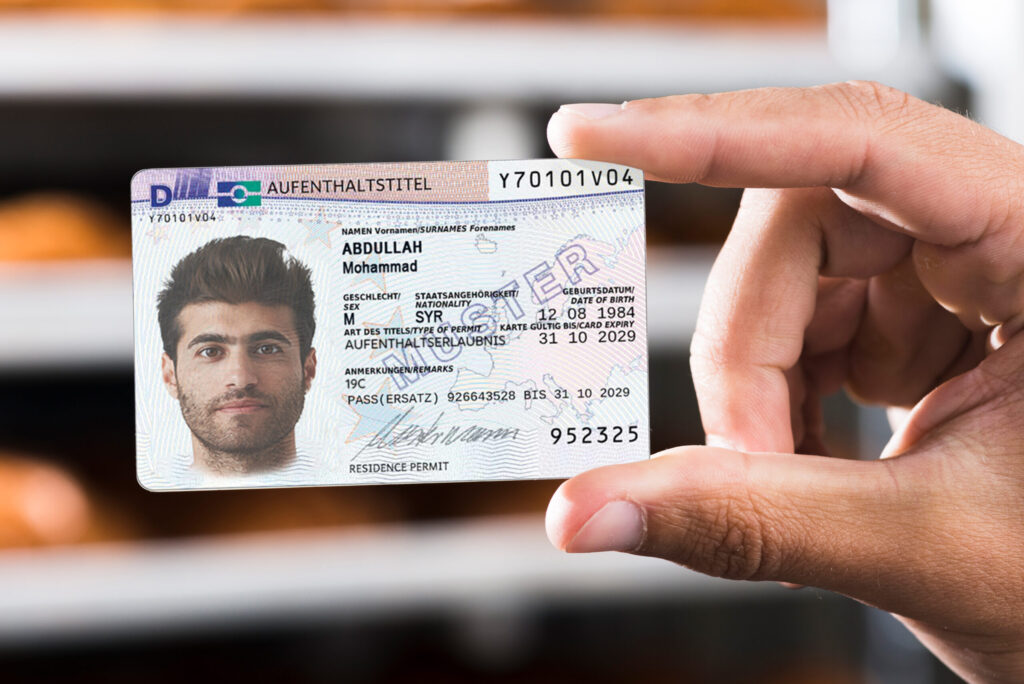This is § 19c AufenthG
§ Section 19c AufenthG is a versatile Residence permit that was introduced with the Skilled Immigration Act on March 1, 2020 and opens up various employment opportunities for foreigners in Germany. This section combines different stays for the purpose of employment and offers flexible options for different skill levels. It includes jobs that do not necessarily require qualified vocational training, which means that foreigners with practical professional knowledge but without formal qualifications can also obtain a Residence permit .
In addition, Section 19c AufenthG contains regulations for employment for special reasons as well as specific provisions for foreign civil servants. This diversity makes the section an important instrument of German immigration policy, which addresses both the needs of the labor market and the various qualification profiles of foreign workers.
The main features of Section 19c AufenthG
§ Section 19c AufenthG offers a flexible opportunity for foreign employees to work in Germany. It takes particular account of practical work experience and opens doors for employees in areas with a shortage of skilled workers.
- Flexibility in terms of qualifications: Unlike other residence permits, the foreigner does not necessarily have to be a skilled worker within the meaning of Section 18b AufenthG.
- Diverse areas of application: The paragraph covers employment stays resulting from the Employment Ordinance as well as those based on intergovernmental agreements.
- Special consideration of professional experience: Section 19c (2) AufenthG enables the granting of a residence permit to persons with distinct professional knowledge, even without formal qualifications such as a degree or training.
Types of § 19c AufenthG
The Residence permit § 19c AufenthG covers various forms of employment for foreigners in Germany. All variants have a labor law background and require proof of gainful employment. The most important types are explained below.
§ Section 19c (1) AufenthG: Diverse employment opportunities
This paragraph is particularly flexible and covers various scenarios:
- Employment based on the Employment Ordinance
- Residence permit can be issued here regardless of a specific qualification.
- The exact requirements are set out in the Employment Ordinance.
- Employment on the basis of intergovernmental agreements
- This can include various voluntary services, such as the Youth Volunteer Service (JFD) or the Voluntary Social Year (FSJ)
- Other employment purposes
- Au pair activities
- Employment within the framework of personnel exchange programs.
§ Section 19c AufenthG is supplemented, for example, by Sections 22a, 24a and 26 BeschV in order to facilitate access to the German labor market for certain occupational groups.
§ Section 22a BeschV, the extension of Section 19c (1) AufenthG since March 2024 offers foreign nursing assistants with relevant training an excellent opportunity to work in Germany. This innovation opens up the German labor market for urgently needed skilled workers in the care sector and should be used by interested parties and employers alike.
§ Section 24a BeschV, in force since November 18, 2023, considerably simplifies the employment of professional drivers. Employers are now solely responsible for checking the legal requirements for driving licenses or professional drivers, which speeds up the recruitment process.
§ Section 26 (2) BeschV, known as the "Western Balkans regulation", was repealed and offers a flexible option for employing workers from the Western Balkan states. Since June 1, 2024, the annual quota has been doubled to 50,000 approvals from the Federal Employment Agency.
These regulations expand the possibilities of Section 19c of the Residence Act and help to specifically address the shortage of skilled workers in Germany, particularly in areas such as transportation and unskilled jobs.

§ Section 19c (2) AufenthG: For specialists without formal qualifications
The second paragraph is aimed at people with special professional skills:
- The target group consists of foreigners with specific professional knowledge.
- A formal qualification such as a degree or training is not required.
- Instead, what counts is many years of professional experience in a specific field.
- It is important to note that there is a shortage of German workers in this occupational field.
§ Section 19c (3) AufenthG: For regional requirements
The third paragraph is applied in special cases:
- There must be a public, in particular regional, economic or labor market policy interest.
- The aim is to remedy a specific shortage in a particular region of Germany.
- The applicant must be able to prove that they can meet precisely this regional need through their work.
§ Section 19c (4) AufenthG: Especially for civil servants
The fourth paragraph is very specific and applies to foreigners who are civil servants:
- The Residence permit is issued directly at the start of the civil servant relationship.
- In contrast to the other variants, no approval from the Federal Employment Agency is required.
- The permit is usually issued for 3 years.

A change to Section 19c AufenthG is thus possible
A change to a Residence permit in accordance with § 19c AufenthG is generally possible, but is subject to certain conditions and in most cases is a discretionary decision by the Foreigners' office.
Change options in § 19c AufenthG
A change to § 19c AufenthG is possible from many other residence titles. However, there are some important points to note:
- Discretionary decision: In most cases, the decision is at the discretion of the Foreigners' office. This means that there is no automatic entitlement to the change.
- Exceptions to the visa procedure: In principle, you must have entered the country with the "required" visa in order to obtain a Residence permit . However, this can be waived if you are entitled to the other Residence permit or if you cannot reasonably be expected to make up the visa procedure. These exceptions can be found in § 39 AufenthV.
Requirements for the change
The requirements differ depending on the paragraph of Section 19c AufenthG:
- § Section 19c (1): The provisions of the Employment Ordinance (BeschV) or intergovernmental agreements apply here.
- § Section 19c (2): Proof of extensive practical work experience and, as a rule, approval by the Federal Employment Agency.
- § Section 19c (3): Proof of a public, in particular regional, economic or labor market policy interest.
- § Section 19c (4): Applies specifically to civil servants and requires proof of civil servant status.

Special regulations for former asylum seekers
§ Section 10 (3) sentence 5 AufenthG specifically regulates the change to a Residence permit in accordance with Section 19c (2) for persons who have withdrawn their asylum application.
The legal text reads:
"A foreigner who has withdrawn his or her asylum application may only be granted a Residence permit in accordance with Section 18a, Section 18b or Section 19c (2) before leaving the country if he or she entered the country before March 29, 2023; the same applies to the granting of a residence permit in accordance with Section 6 to the foreigner's spouse and unmarried minor child."
This provision allows a change to Section 19c (2) AufenthG under the following conditions:
- The asylum application was withdrawn.
- Entry took place before March 29, 2023.
- The change can be made before departure.
This provision creates a limited possibility for asylum seekers who entered the country before the cut-off date and have withdrawn their application to switch to a Residence permit for qualified employment.
It aims to relieve the asylum system of people who have actually come to Germany for economic reasons, while at the same time addressing the shortage of skilled workers.
The advantages of § 19c AufenthG
There are various positive aspects of Section 19c AufenthG. However, these do not apply to all variants of the residence permit. The positive points are primarily the possibility to travel, employment without employer ties, family reunification and the path to a Settlement permit and Naturalization.

Travel with § 19c AufenthG
Regardless of which version of Section 19c AufenthG you have, the following applies: Traveling both in Germany and abroad is possible without difficulty. Visiting your home country is also possible without any problems. It is generally important that you always have valid travel documents (national passport) with you in addition to your Residence permit . If you observe these conditions and requirements, nothing will stand in the way of your trip.
Family reunification with § 19c AufenthG
The changes to family reunification for holders of a residence permit in accordance with Section 19c AufenthG from March 1, 2024 will bring significant relief. One major change is the elimination of the "sufficient living space" criterion for skilled workers with this Residence permit. This will make it much easier for spouses and children to join them.
In addition, the option of parental reunification was introduced, which also extends to parents-in-law, provided the skilled worker's spouse lives permanently in Germany. This option applies to skilled workers who received their Residence permit for the first time from March 1, 2024.
The basic requirements for family reunification remain the same, such as a residence permit valid for at least one year and, as a rule, two years' possession of Section 19c AufenthG and an employment relationship of more than one year.
These changes are aimed at positioning Germany as an attractive destination for qualified skilled workers and facilitating family reunification.

Settlement permit vs. Naturalization
Below we explain what requirements you need for the permanent Residence permit or for the German passport.
Settlement permit according to § 19c AufenthG
The path to a Settlement permit varies depending on the variant of Section 19c AufenthG. Holders of § 19c Para. 4 AufenthG (foreign civil servants) can apply for a Settlement permit after just 3 years, while a waiting period of 5 years applies for all other variants (§ 19c Paras. 1, 2 and 3).
The application process includes:
- collecting the necessary documents,
- filling out the application form
- and its submission to the Foreigners' office.
The necessary evidence includes:
- 60 months of pension insurance contributions,
- a B1 language certificate,
- Passing the naturalization test,
- as well as proof of livelihood,
- a valid employment contract
- and proof of identity and residence.
Settlement permit with § 19c AufenthG?
Naturalization with § 19c AufenthG
Naturalization can take place either directly from the Residence permit § 19c AufenthG or via the intermediate step of the Settlement permit .
The process begins with:
- Collecting the necessary documents
- and completing the naturalization application at the competent authority.
The required documents include
- a signed declaration of loyalty,
- a B1 language certificate,
- proof of the required duration of stay,
- a passed naturalization test,
- as well as securing their livelihood.
After submitting the complete application and a processing time that can take several months, the naturalization certificate is issued if the decision is positive, and the applicant is granted German citizenship.
Naturalization with § 19c AufenthG?
FAQ - Frequently asked questions about the Residence permit according to § 19c AufenthG
§ Section 19c AufenthG is a Residence permit for foreigners with professional qualifications, foreigners with civil servant status, foreigners with special regional economic, labor market policy reasons or foreigners with other professional activities.
Since March 2024, there have been important changes to family reunification for holders of a residence permit in accordance with Section 19c AufenthG. The criterion of "sufficient living space" for skilled workers no longer applies, which makes it much easier for spouses and children to join them. In addition, the possibility of parental reunification has been introduced, which also extends to parents-in-law, provided the spouse of the skilled worker lives permanently in Germany.
Yes, you can acquire German citizenship with a Residence permit according to § 19c AufenthG. The Naturalization process can be carried out either directly from the Residence permit § 19c AufenthG or via the intermediate step of the Settlement permit , whereby certain requirements such as a sufficient period of residence, language skills and a passed naturalization test must be met.
§ Section 19c AufenthG covers various types of employment, including activities based on the Employment Ordinance, intergovernmental agreements and other employment purposes such as au pair activities or personnel exchange programs. It also enables the employment of specialists without formal qualifications, addresses regional needs and offers special regulations for foreign civil servants.
A change to Section 19c AufenthG is possible from many other residence titles, but is usually subject to a discretionary decision by the Foreigners' office. The regulation is particularly relevant for people who have withdrawn their asylum application and entered the country before March 29, 2023 - they can switch to Section 19c (2) AufenthG under certain conditions. In principle, you must have entered the country with the required visa, although exceptions are possible if there is an entitlement or it is unreasonable to expect you to obtain a visa.
The waiting period for a Settlement permit with a Sec. 19c AufenthG varies depending on the type of residence permit. For holders of § 19c para. 4 AufenthG (foreign civil servants), the waiting period is only 3 years, while for all other variants (§ 19c para. 1, 2 and 3) a waiting period of 5 years applies. In addition, further requirements must be met, such as 60 months of pension insurance contributions, a B1 language certificate and passing the naturalization test.







